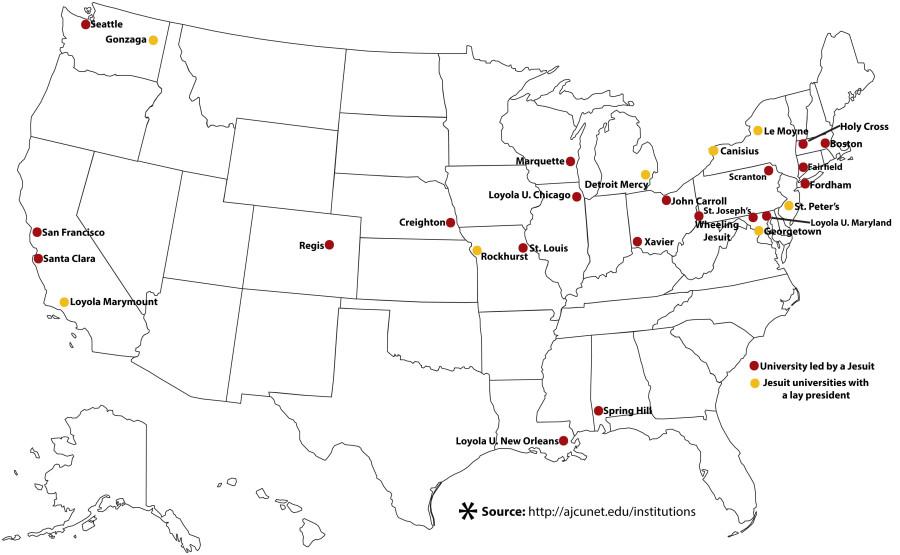For more than 100 years, 23 presidents of the Roman Catholic order, the Society of Jesus, have led Marquette.
But soon this may not be the case.
After the Rev. Scott Pilarz was inaugurated as university president in 2011, the bylaws of Marquette changed to allow a layperson, a non ordained member of the church, to become president of Marquette. Now that Pilarz resigned, the presidential search committee has the opportunity to enact that policy.
The search committee announced in a news brief Monday that interviews with qualified Jesuit and layperson semifinalists and finalists will take place in the spring. It hopes to have a president in place for the next academic year. According to the presidential search website, the 24th president will begin his or her term Aug. 25, 2013.
John Ferraro, chairman of the presidential search committee and a member of the Board of Trustees, said the search committee is considering lay candidates for the presidency as well as Jesuits.
“We are definitely considering the best man or woman to be the 24th president of Marquette University,” Ferraro said. “The world has changed and the Jesuit pool has changed and dwindled and so many of the Jesuit universities have lay presidents so it is a function of where we are in the world.”
In the 1960s, Jesuit membership in the U.S. peaked with about 7,000 priests. By 1982, the number diminished to 5,500. Today, there are about 2,500 American Jesuits.
This stark decrease led many universities to change their leadership requirements in the past decade.
In 2001, trustees at Georgetown University, the country’s oldest Roman Catholic university, selected John Degioia, an alumnus, as its first lay president. He became the first layperson to lead any of the country’s 28 Jesuit colleges and universities.
Since Degioia’s inauguration, similar cases sprung up around the country.
Seven of the 28 schools in the Association of Jesuit Colleges and Universities have lay presidents. In addition, 63 percent of the 194 U.S. Catholic colleges that belong to the Association of Catholic colleges and universities are led by laypeople.
Interim University President the Rev. Robert A. Wild said the Board of Trustees deliberated for many years before deciding to amend the bylaws in 2011.
In doing so, the board specified that, although the president does not need to by a Jesuit, he or she must be of the Roman Catholic faith.
While the bylaw was changed, Ferraro said the presence of a leader of the Roman Catholic faith remains an important characteristic of the university president.
“The Jesuit mission, the ability to lead a religious institution, the Catholic identity has to be in the DNA of the president whether they are Jesuit or lay – that will not change – cannot change,” he said. “For me, one of the most important – absolutely, if not at the top of the list for me, personally – is making sure that leader has the Jesuit mission and Catholic identity in the DNA of the person.”
The idea of having a non-Jesuit in office received varied responses from students and campus Jesuits.
The Rev. Joseph Mueller, an associate professor of theology and director of graduate studies, said lay leadership differs from Jesuit leadership because of the basic difference in faith.
“Marquette and the Jesuits would have to make their relationships even more explicit than it is now,” Mueller said. “The president would have to maintain good relationships with Jesuit leaders, as well as with the Jesuit community here at Marquette.”
Mueller said if a layperson is sworn into office, he or she should take the spiritual exercises of Saint Ignatius Loyola as an important guide for his or her life, prayer and professional work.
Though there are differences in some aspects of Jesuit and Roman Catholic leadership, Mary O’Keefe, a freshman in the College of Arts & Sciences, said she thinks having a lay president would add to the depth of the university and give it a new perspective.
“I would have no issue with it,” she said. “I think change is good and even though there are differences between a Jesuit leader and a lay leader, the differences aren’t necessarily bad.”
On top of the possibility of a layperson leading the university, the idea of having a female president is also on some students’ minds, including O’Keefe’s.
“I think it would be great to have a woman president,” she said. “I think that would actually give an even greater different perspective than a layperson just because males and females see things so differently.”
Mueller put an emphasis on hiring the best available candidate, regardless of gender. Maxwell Havlik, a sophomore in the College of Arts & Sciences, agreed.
“I guess it doesn’t matter who is president based on religion or gender,” Haylik said. “I think it is more important what they can do while they are in office to improve the university and create change.”

